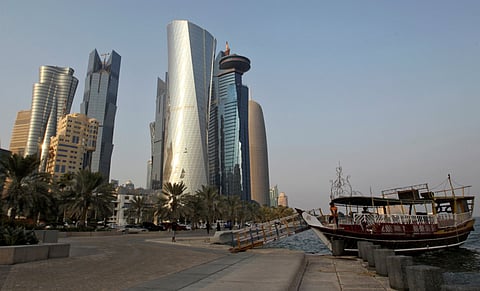Where Doha went wrong
From its provocative military exercises to attempts at politicising Haj, Qatar has time and again laid its sinister agenda bare

The Qatari regime’s practices are adding more obstacles to its ongoing crisis with the anti-terror quartet — Saudi Arabia, UAE, Bahrain and Egypt. In an attempt to stick to its unreasonable position, rather obdurately, Doha is negating any effort by its neighbouring countries to bring the tensions down.
The Qatari regime is well aware that it is destroying its relations with the Gulf Cooperation Council. It is under an illusion — fed by the likes of Azmi Bishara and other such advisers — that their persistence will push the anti-terror quartet into withdrawing their demands. In that Doha is completely mistaken.
Qatar has, so far, bet on the idea of internationalisation of the pressure on the anti-terror quartet to go off the hook. A sustained negative media campaign has proven counter-effective, though. The result was the internationalisation of the Qatari file in support and sponsorship of terrorism. It also resulted in many more countries pointing at the Qatari regime for its financing of terrorism. Doha can no longer deny the evidence published in newspapers across the globe.
The internationalisation of the regional crisis was a strategic miscalculation. Major global powers do not want to put their strategic interests with the four Arab countries at stake in support of the misleading Qatari position. The scenario also encouraged the anti-terror quartet to defend its position and provide evidence of how Qatar is actively abetting and financing terrorism. Pertinently, the Arab quartet, aware of the ties that the people of Qatar share with their brethren in the region, have all along tried to keep the interests of ordinary Qataris in mind.
The biblical Samson had pulled apart the pillars of a temple, bringing down the roof and killing himself and thousands of his opponents. But when Doha attempted to follow the ‘Samson model’, it brought trouble to its own people, damaged its own reputation and harmed none of its neighbouring Arab countries. Let us not forget that Qatar does not have what it takes to force other Arab nations to yield.
It is a fact that Qatar’s strategy has mostly relied on confusing the issue and turning regional problems into an international crisis. In desperation, Doha gravitated towards the mullahs of Iran and Turkish president Recep Tayyip Erdogan.
In recent months, Qatar has conducted joint military exercises with Turkey, apart from two naval exercises with the British Royal Navy (last month), two manoeuvres with United States’ forces (in June) and another exercise with the French Navy (also in June). This unprecedented number of military exercises shows how panic has gripped Doha. The country has also made a series of arms deals, most notably the purchase of $12 billion (Dh44.13 billion) worth of F-15 fighters from the US, and a deal with Italy for arms worth around 5 billion euros (Dh21.81 billion). All of this defies logic.
To make things worse for itself, Doha attempted to play a very sensitive card against Saudi Arabia. It demanded internationalisation of the supervision of Haj pilgrimage and adopted Iran’s demand in a moment of sheer recklessness. The Qatari regime, confused by the political conflict, entered a thorny area and pressed on with a strategically sensitive issue. The sensitivity of the issue of Haj for Saudi Arabia is not lost on Doha. In fact, the Iranians themselves did not resort to complaining with the United Nations. Unlike Doha, Tehran is aware that the pilgrimage issue is a lost political game, but serves as fresh material for media and propaganda marketing. Doha did not realise that this catastrophic step was procedurally ineffective. From its provocative military exercises to attempts at politicising Haj, Qatar has time and again laid its agenda bare.
Dr Salem Al Ketbi is an Emirati political analyst, researcher and opinion writer.



